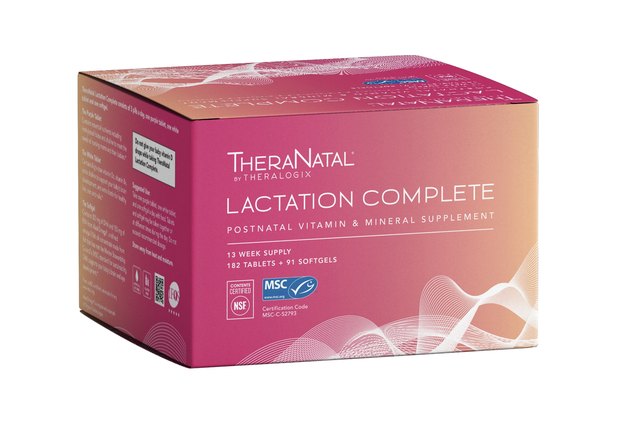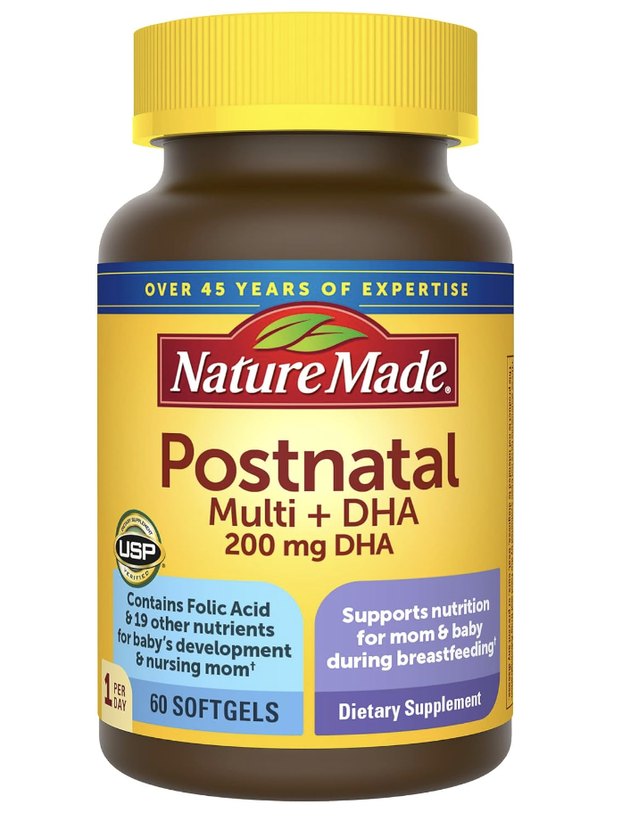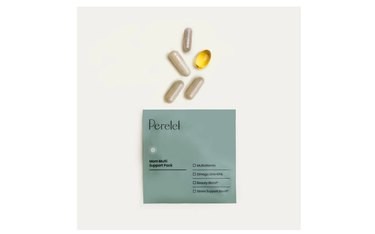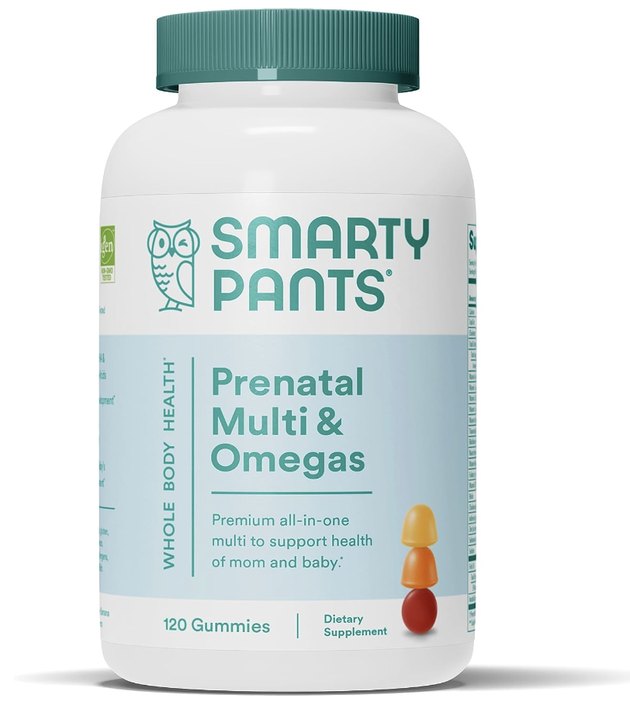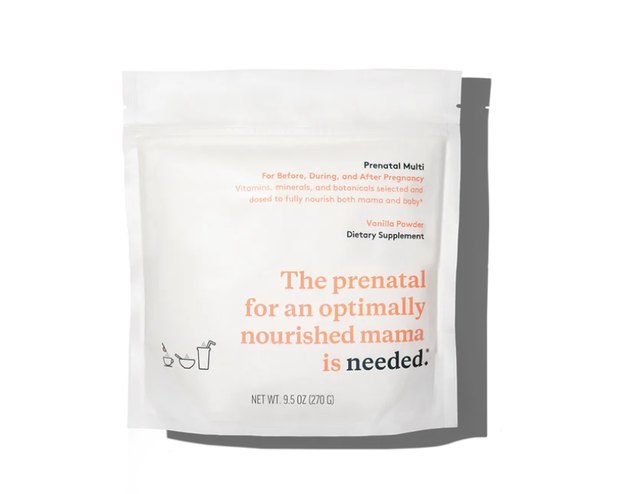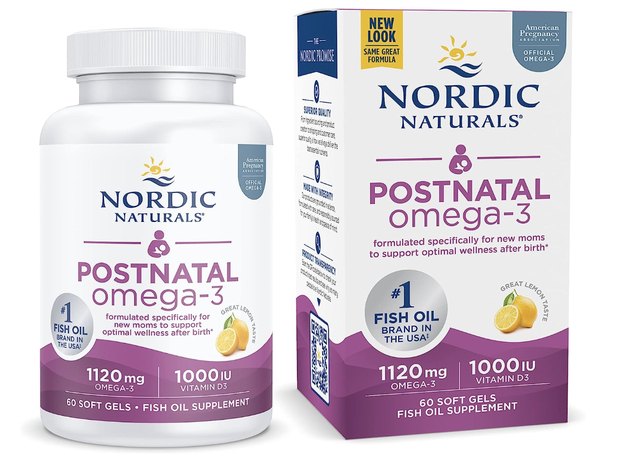
Car seat — check. Midnight diaper changes — no problem. Baby snuggles — of course! You're rocking this parent gig already, but if all of the responsibilities have you taking a shortcut with your diet, it's time to get that under control, too.
If you were a strict follower of your doctor's instructions for your prenatal vitamin, don't let the birth of your baby stop you from keeping up with your health.
Video of the Day
Video of the Day
Prenatal supplements are designed to support a healthy pregnancy, but you've had a lot happen to your body over the last nine-plus months — including giving birth to a baby (or multiple) — and you still have some pretty impressive nutrient needs.
While a nutritious diet is the best way to meet these needs, a postnatal supplement could help you fill in any remaining gaps.
The Best Postnatal Vitamins
- Best Overall: Theralogix TheraNatal Lactation Complete Postnatal Supplement ($90, Amazon)
- Best on a Budget: Nature Made Postnatal Multi + DHA ($24.90, Amazon)
- Best Subscription: Perelel Mom Multi Support Pack ($49.50/month, Perelel)
- Best Gummy: SmartyPants Prenatal ($29.71, Amazon)
- Best Vegetarian: Needed Prenatal Multi-Powder ($69.99, ThisIsNeeded)
- Best DHA: Nordic Naturals Postnatal Omega-3 ($31.41, Amazon)
How We Chose
When choosing these postnatal supplements, we tapped two experts in maternal nutrition for their recommendations on what is needed in the postnatal period: Kerry-Ann Kelly, MD, an ob-gyn with Spora Health, and McKenzie Caldwell, MPH, RDN, a fertility and prenatal dietitian.
Along with providing the nutrients new birthing and breastfeeding/chestfeeding parents need, each of these supplements has, at a minimum, met rigorous standards for quality, and that typically means they have been third-party tested for your safety and peace of mind.
Learn more about how we cover products.
Prenatal vs. Postnatal: What's the Difference?
The majority of nutrients don't change significantly from a prenatal to a postnatal supplement. The amount of iron in your postnatal will decrease. Typically folate will stay the same, but your needs decrease slightly.
You have slightly increased needs for the following nutrients postpartum, so make sure your postnatal supplement contains them.
1. Best Overall: Theralogix TheraNatal Lactation Complete Postnatal Supplement
2. Best on a Budget: Nature Made Postnatal With DHA
3. Best Subscription: Perelel Mom Multi Support Pack
Pros
- Third-party tested
- Budget-friendly subscription option
- Contains DHA and iron
Cons
- Several pills to swallow
This subscription-based supplement pack was formulated by ob-gyns to support new parents for up to five years after giving birth. Each daily pack contains two multivitamins, one DHA-EPA softgel and capsules for stress, skin and hair support.
It boasts the higher dose of vitamin D (2,000 IU); folate, B12 and other essential B vitamins; some iron, iodine and zinc; and DHA.
Plus, it's third-party tested to ensure the quality of the ingredients, which are also gluten-free, dairy-free and soy-free. And if you sign up for a subscription plan, you'll get 15 percent off your monthly order, plus access to exclusive perks such as access to Perelel's digital community, expert-backed info on your health needs and the ability to pause your subscription at any time.
Buy it: Perelel; Price: $58.24 for a one-time purchase or $49.50/month
4. Best Gummy: SmartyPants Prenatal
5. Best Vegetarian: Needed Prenatal Multi-Powder
6. Best DHA: Nordic Naturals Postnatal Omega-3
What to Look for in a Postnatal Vitamin
The supplement aisle can be confusing, and the online space is even harder to navigate. Here's your checklist to help you find a high-quality postnatal vitamin:
1. The Right Nutrients
Vitamin D: Vitamin D will continue to be an important nutrient for you post-birth, regardless of whether you choose to breastfeed. Caldwell recommends a minimum of 2,000 IU in your supplement.
"Research suggests that low levels of vitamin D may be linked to postpartum depression," Dr. Kelly says. "For this reason, your doctor may recommend vitamin D as one supplement to try postpartum to help prevent and alleviate symptoms of depression, as well as support the immune system to keep you healthy."
Iron: Your iron needs increase substantially during the prenatal period, but they decrease during the postnatal period. Most postnatal supplements do not have a large amount of iron, but Caldwell suggests continuing your prenatal supplement until you run out. There is more iron in a prenatal vitamin than you will need in a postnatal, but immediately after giving birth, you may need it.
"You've likely lost a good deal of iron during birth, so this is a key nutrient many new moms will need," Dr. Kelly says. "Particularly if you're someone who typically doesn't get enough iron in their diet (like vegetarians, for example), definitely consider taking iron supplements or a postnatal vitamin with iron."
When you run out of your prenatal, feel free to make the switch to a postnatal with the OK from your health care team.
Tip
Postnatals are lower in iron than prenatals or even a typical women's multivitamin, so when you start menstruating again, you'll need to get back to the recommended daily amount of 18 grams per day.
DHA: Omega-3 fatty acids are not only important for you and your health, but also to support brain development in your baby if you are breastfeeding or chestfeeding, Dr. Kelly says.
DHA needs increase during pregnancy, and those needs stay about the same during lactation, so if you found an omega-3 supplement you liked during pregnancy, you can continue to take that.
B12: Vitamin B12 is another necessary nutrient to get in your postnatal, Dr. Kelly says. "Babies deficient in vitamin B12 have been shown to be more irritable, have increased risk for developmental delays and failure to thrive and more."
If you're breastfeeding or chestfeeding, make sure your prenatal has 100 percent of your daily recommended amount of B12.
Folate: Folate needs continue during the postpartum period, but the type of folate you take isn't as important as it is in your prenatal supplement. During the prenatal period, folate in the form of folic acid serves mainly to prevent neural tube defects in your developing infant.
During the postnatal period, all types of folate are acceptable to help keep your folate stores full. You might see folic acid, whole-food folate or methylfolate as forms of folate available in your postnatal supplement.
2. Third-Party Testing
Third-party testing means a supplement has passed an independent review of quality, purity and, most often, heavy metal contamination. There are multiple third-party testing labs, but the big three you might see on supplement labels are NSF, USP and Consumer Lab.
Third-party testing ensures your supplement has what it says on the bottle and in the proper amounts. This is your first check when buying a supplement, and you should think carefully about buying one that isn't tested independently.
3. Limited Fillers
Especially if you are breastfeeding or chestfeeding, you need to make sure your supplement doesn't have any fillers that could be harmful if passed through your milk. Many supplements have herbs or herb blends, so it's important to give a quick call to your doctor to make sure these are safe for you — and your baby, if you're breastfeeding/chestfeeding.
In addition, supplements may be a source of allergens if that is something you have to worry about. The common culprits are gluten, soy and dairy.
Some multivitamins, especially gummies, have added sugar, so if that's something you're watching, just be aware.
Tip
Always check out the dosage on your supplement bottle. Often, postnatals may require more than one pill or gummy, so check your dosage before you take them to make sure you're getting everything you need in the right amounts.
Who Needs a Postnatal?
It's important to note that the American College of Obstetricians & Gynecologists (ACOG) does not make any recommendations about postnatal vitamins.
While some experts believe most people can get the nutrients they need after birth through a well-balanced diet, others believe vitamin supplementation (like postnatals) is important, especially for parents who breastfeed or chestfeed, per the American Pregnancy Association.
Some people (with the approval of their doctor) may even choose to continue taking prenatal vitamins after birth to make sure their breastmilk has the nutrients their baby needs. This may be important for those who don't eat a balanced diet, or follow a specific diet (like gluten-free or vegetarian, for example), per the Centers for Disease Control and Prevention (CDC).
But keep in mind the ACOG doesn't make any specific recommendations about how long prenatals should be continued after birth, either.
The bottom line: Once you've given birth (whether vaginally or through C-section) your nutrient needs change. It's important that you get enough essential vitamins and minerals, macronutrients (aka carbohydrates, protein and fat) and water, not only for you, but for your baby, too.
"This will help your body heal," Dr. Kelly adds.
If you don't know whether you're lacking in certain nutrients, talk to your doctor. They can run some blood work and let you know whether you need a postnatal vitamin.
When to Talk to Your Doctor
Everyone's needs are different, and your needs after birth are unique. This is why it's worth talking to your doctor at your next postpartum check-up, to see whether you need a postnatal, the ingredients to look out for and how long after birth you should take it.
- NIH: "Iron"
- Medical Clinics of North America: "Nutrition Recommendations in Pregnancy and Lactation"
- American Academy of Pediatrics: "Vitamin D & Iron Supplements for Babies: AAP Recommendations"
- Pediatrics: "Maternal Versus Infant Vitamin D Supplementation During Lactation: A Randomized Controlled Trial"
- American Pregnancy Association: "Postnatal Vitamins While Breastfeeding"
- CDC: "Maternal Diet and Breastfeeding"
- Critical Reviews in Food Science and Nutrition: "Postpartum depression and vitamin D: A systematic review"
